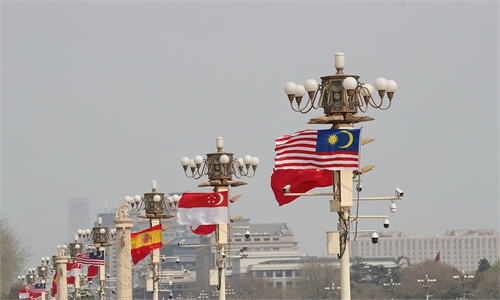
A ceremony is held in Shanghai on April 20 to mark the arrival of the first shipment of seaborne Philippine durians in the city.
A ceremony was held in Shanghai on Thursday to mark the arrival of the first shipment of seaborne Philippine durians in the city, after an export protocol was signed between China and the Philippines in January.
A major importer Dole Food Co and one of the dealers Shanghai Wonong Import & Export Co signed a sales deal on site, which is expected to lift annual turnover to 2,000 tons for 2023.
“There is a growing community of Chinese consumers who love durians. We are happy that the door is open for Philippine durians. We are confident that Chinese consumers will also fall in love with Philippine durians,” Jaime Adriano FlorCruz, the Philippines' ambassador to China, told the Global Times at the launch event.
Chinese Customs issued a notice on January 7, allowing imports of fresh durian from the Philippines that meet relevant requirements to enter the Chinese market. This makes the Philippines the third country to receive approval for exporting fresh durian to China after Thailand and Vietnam.
The first shipment of 18 tons of Philippine durians by air freight entered China on April 7.
“Since April 7, we have imported a total of 90 tons of Philippine durians,” Wang Na, marketing director of Dole, told the Global Times on Thursday.
She noted that the ripening season for Philippine durians have two time windows – February to April and July to October – which will cover the growing period for Thai durians.
“After testing the water in the first half of the year, we expect more Philippine durians to hit the Chinese market in the second half of the year,” Wang said.
In recent years, China and the Philippines have maintained close economic and trade cooperation, especially when it comes to agricultural products.
The Philippines is China's largest source of imports of bananas and pineapples, and China is the third-largest export market for agricultural products of the Philippines, according to the Ministry of Commerce of China.
The Regional Comprehensive Economic Partnership (RCEP), the world's largest trade deal, will be effective for the Philippines on June 2. It is believed that with more dividends from the RCEP being unleashed, bilateral trade and economic cooperation will become deeper.
“Once our RCEP membership kicks in, I think we will benefit from a lower tariff for our products. China is a huge market so we are really optimistic that we will benefit from such a partnership,” FlorCruz said.
In the first quarter of this year, China's imports and exports with 14 other RCEP members totaled 3.08 trillion yuan ($447 billion), a year-on-year increase of 7.3 percent. This accounted for 31.2 percent of China's total foreign trade in the same period, an increase of 0.8 percentage points over the same period last year.

